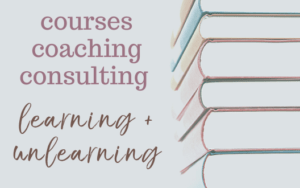How can those of us who identify as white, who are conditioned into whiteness, and who have internalized white supremacy recognize and respond to emotions before they do harm?
How can we take accountability when they do?
And how can we recognize complicity with the long-standing harm and systems that prevent taking accountability?
These questions motivate the “40-Day Practice: Strengthening Emotional Stamina to Counter White Fragility”: a daily practice of emotional work, which begins this week.
In many ways, reckoning with white fragility begins with reckoning with whiteness, which is all around and in us—like the air we breathe. Here’s a definition from Robin DiAngelo’s 2011 article “White Fragility,” citing sociologist Ruth Frankenberg, who defined whiteness as multi-dimensional:
“Whiteness is a location of structural advantage, of race privilege. Second, it is a ‘standpoint,’ a place from which White people look at ourselves, at others, and at society. Third, ‘Whiteness’ refers to a set of cultural practices that are usually unmarked and unnamed. (p.1)” (page 56, emphasis added)
These three components of whiteness—(1) structural advantage, (2) standpoint or perspective, and (3) cultural practices—add up to triple trouble. Particular ways of being and doing—and, therefore, people involved in this being and doing—are privileged over others. These three components reinforce and concretize dehumanization so that hierarchical power structures (including white supremacy, heteropatriarchy, and interconnected oppressions) show up throughout everyday life. The work of unlearning whiteness is critical, and yet the unlearning process is messy, messy, messy.
Performances of white fragility come out especially through the unlearning process and in multiracial educational spaces, doing further harm and asking us to take seriously calls for white caucus spaces. The 40-day practice takes up these calls, acting on the YWCA’s goals for white caucuses to help with deepening self-reflection, commitment, and accountability among white folks.
By holding space for emotionally messy and imperfect work, the 40-day practice strives to shift habits, to facilitate learning + unlearning, and to build the critique for racial justice, hopefully in a form that lessens harm along the way.
So, what is white fragility?
From the same 2011 article, DiAngelo defines white fragility as: “a state in which even a minimum amount of racial stress becomes intolerable, triggering a range of defensive moves. These moves include the outward display of emotions such as anger, fear, and guilt, and behaviors such as argumentation, silence, and leaving the stress-inducing situation” (page 54).
White fragility, therefore, is a description of emotional and behavioral responses when facing racial stress (matters of race and racism). Fragility itself is a myth that causes harm, invoking (implicitly or explicitly) a victim narrative that manifests through actions such as defensiveness, conflict avoidance, denial, unwillingness to see wrongdoing, and unwillingness to break from the idea that there are good and bad people.
The self-work or “shadow work” of countering white fragility involves recognizing that “fragility” is a socialized state and a functioning apparatus of oppression and, therefore, truly a myth—but a powerful myth that does harm. From this recognition, work toward investigating and divesting from white fragility can happen. And then it’s possible to create new emotional patterns.
To explain further, here are some patterns that DiAngelo identifies, quoting pages 68-69 of White Fragility:
Preference for racial segregation, and a lack of sense of loss about segregation
Lack of understanding about what racism is
Seeing ourselves as individuals, exempt from the forces of racial socialization
Failure to understand that we bring our group’s history with us, that history matters
Assuming everyone is having or can have our experience
Lack of racial humility, and unwillingness to listen
Dismissing what we don’t understand
Lack of authentic interest in the perspectives of people of color
Wanting to jump over the hard, personal work and get to “solutions”
Confusing disagreement with not understanding
Need to maintain white solidarity, to save face, to look good
Guilt that paralyzes or allows inaction
Defensiveness about any suggestion that we are connected to racism
A focus on intentions over impact.
Note that white fragility has multiple manifestations, takes different shapes, and functions in varied ways: from desiring a cocoon of comfort to outright bullying.

It’s important to name that white fragility can manifest in aggression. Or, when not outright aggression, then as defensiveness, which peace studies scholars describe as the first step of offensiveness. I believe this is what Bettina L. Love speaks to in “There’s Nothing Fragile about Racism” and why reckoning with these manifestations (these power abuses) is essential work. There’s much to do toward disrupting harm and taking greater accountability for harms done.
To learn more, explore the resources on DiAngelo’s website, Love’s important article, DiAngelo’s short piece “White People Assume Niceness Is the Answer to Racial Inequality. It’s Not,” and Anna Kegler’s related critique “The Sugarcoated Language of White Fragility.”

Also, if I could highlight one book to read as a companion text to the 40-day practice, it would be Resmaa Menakem’s My Grandmother’s Hands: Racialized Trauma and the Pathway to Mending Our Hearts and Bodies (2017, Central Recovery Press).
I keep returning to this book not only for explanations of racialized trauma (what underlies white fragility) but especially for the range of embodied and contemplative practices recommended. Menekem also offers a 5-day “Free Racialized Trauma Course by the Cultural Somatics Institute,” which I recommend.
Truly, there’s much to learn and to unlearn, which is why I’m embarking again on this practice.
With courage, curiosity, and commitment,
Beth <3
—
This post is written by Beth Godbee, Ph.D. for Heart-Head-Hands.com. If you’re interested in learning more, check out the 40-day practice registration page and commitment statement.
Become a subscriber via Patreon to receive ongoing support for your efforts of striving to live for justice (social, racial, and environmental justice). And consider subscribing to the newsletter for additional resources and announcements. Thanks!



Leave a Reply